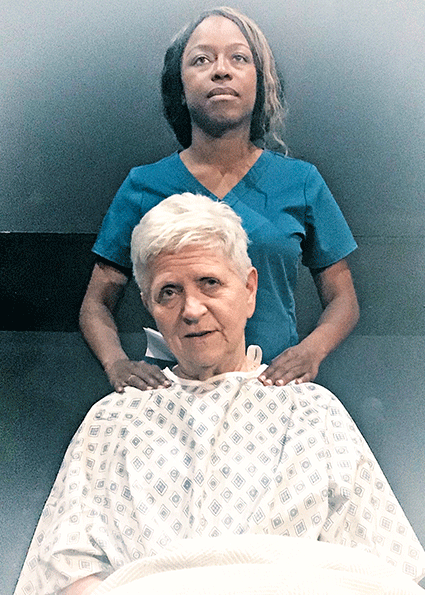In the United States, the issue of death tax (euphemistically termed estate tax by the government) became a political football in 2010. Four billionaires died that year, which just happened to be the year federal estate tax expired. As an example of the money involved, if New York Yankee George Steinbrenner had died in 2009 instead of 2010, his family would have faced a tax bill of $500 million. As it turned out, they were treated to what was called at the time “the ultimate home run.” Several senators, including the socialist Bernie Sanders, were outraged. Estate tax returned in 2011.
What if you had a lot of money and were hospitalised with a condition that seemed terminal? Suppose further you had a daughter just waiting for you to die before January 1, when the death tax was set to rise. Would it be paranoid to think your evil daughter was paying off your all-too-friendly nurse to nudge you towards oblivion before the end of the year.
That is the premise behind the play Death Tax. It is the third play by Lucas Hnath produced by Hyde Park Theatre in Austin, the others being A Doll’s House, Part 2 (this season) and The Christians (in 2016). Death Tax had its premiere in 2012 at the Actors Theatre of Louisville’s Humana Festival of New American Plays, and it had a short run in 2013 at London’s Royal Court Theatre.
Death Tax has been accused of being overly contrived. Be that as it may, the play is so deeply disturbing on so many levels it is difficult to find more than a glimmer of redemption within any of the four characters.
We have the bed-ridden grandma Maxine (played with passion by Lana Dieterich), her daughter (played by Sarah Chong Harmer), Maxine’s Haitian nurse Tina (Web Jerome) and Tina’s boss Todd at the nursing home/hospital, played by Chase Brewer.
The final scene in the play is the finest example of bathos (in its definition as overdone pathos) I have seen. Set as it is in a science-fiction future 20 years advanced from the earlier part of the play, it pits Maxine against her grandson (also played by Brewer) in a final tug of war over life on one side and money on the other. Anyone with a family must simply hope they never have to face such a confrontation in real life.
The time shift does seem to open up a plot hole. If Maxine was so rich she could afford care for 20 years past the date she expected to expire, why did Todd have to pay for a specialist doctor in the weeks leading up to the January 1 date 20 years in the past? In any case the synergy between Todd, Tina and the daughter opens up another kind of hole for Todd: a moral sinkhole that he literally jumps into. It is quite Faustian.
The play raises several important issues, such as: Is it right for the next generation to get all the inheritance money, instead of having much of it grabbed by the government?; Who should make the decision about the location of care: the patient, the family, or a health authority of some sort?; if you knew the death tax was going to rise a lot soon, and you really were on good terms with your family, would you be willing to hasten your own death to ensure they got the most money possible? The last is really the inverse of the question posed by Hnath, but is just as pertinent.
Excellent acting from this ensemble cast maintains the drama, leavened by the occasional jigger of sly humour. The intimate surroundings of this small theatre venue are perfectly pitched for this play that eschews a cathartic ending. Definitely worth a visit to Hyde Park Theatre.
Photo: Web Jerome (standing) and Lana Dieterich, a 40-year veteran of Austin theatre.
Hyde Park Theatre is located at 511 W. 43rd Street, Austin. Covered off-street parking for the patrons of HPT is available during performances in the lot at 4315 Guadalupe Street, just north of The Parlor. You can drive through The Parlor’s parking lot to reach it. Evening HPT parking also available at the Hyde Park Church of Christ on the northeast corner of 43rd & Avenue B.
Death Tax (directed by Ken Webster) is being performed until July 27, 2019. Visit the website for tickets: hydeparktheatre.org
